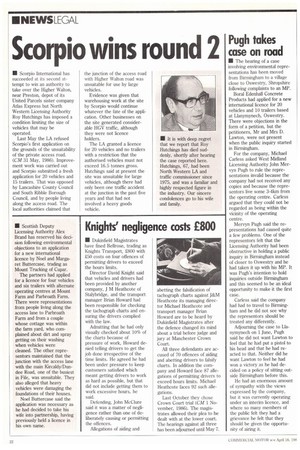Pugh takes case on road
Page 24

If you've noticed an error in this article please click here to report it so we can fix it.
• The hearing of a case involving environmental representations has been moved from Birmingham to a village close to Oswestry, Shropshire following complaints to an MP.
Boral Edenhall Concrete Products had applied for a new international licence for 20 vehicles and 10 trailers based at Llanymynech, Oswestry. There were objections in the form of a petition, but the petitioners, Mr and Mrs D. Lawton, were not present when the public inquiry started in Birmingham.
For the company, Michael Carless asked West Midland Licensing Authority John Mervyn Pugh to rule the representations invalid because the company had not received any copies and because the representors live some 3-41cm from the operating centre. Carless argued that they could not be regarded as being within the vicinity of the operating centre.
Mervyn Pugh said the representations had caused quite a few problems. One of the representors felt that the Licensing Authority had been obstructive in holding a public inquiry in Birmingham instead of closer to Oswestry and he had taken it up with his MP. It was Pugh's intention to hold inquiries outside Birmingham and this seemed to be an ideal opportunity to make it the first case.
Carless said the company had had to travel to Birmingham and he did not see why the representors should be treated any differently.
Adjourning the case to Llanymynech on 1 June, Pugh said he did not want Lawton to feel that he had put a pistol to his head and that he had reacted to that. Neither did he want Lawton to feel he had won a victory as he had decided on a policy of sitting outside Birmingham before this.
He had an enormous amount of sympathy with the views expressed by the company, but it was currently operating under an interim licence, and where so many members of the public felt they had a grievance he felt that they should be given the opportunity of airing it.




















































































